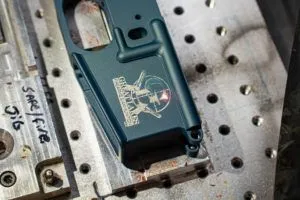Update: Michigan Gun Control
Since Michigan United Conservation Club’s inception in 1937, our membership has solidified broad support for an individual’s firearm rights, opposing any attempt to infringe on lawful firearm owners among our membership.
The organization’s grassroots, member-driven policy supports enforcing existing firearm laws and opposes new regulations on our members who are responsible, legal gun owners.
MUCC submitted written testimony to both House and Senate committees, but over the course of six committee hearings, firearms and conservation organizations were given few moments out of the 15-plus hours of verbal testimony.
On April 13, Gov. Gretchen Whitmer signed into law two of the three gun-control packages — with the red flag legislation heading to her desk shortly. These bills were not granted immediate effect and will go into effect 90 days after the end of the legislative session in 2023.
Throughout the process, MUCC continuously engaged lawmakers, providing written and verbal testimony on the negative impacts these new regulations would have on conservation funding, lawful hunters, trappers, shooters and youth learning to hunt and shoot safely.

Senate Bills 79-82, Safe Storage Requirements ( Public Acts 14-17 of 2023 )
These bills represent what are being called “safe storage requirements.” Under the new laws, an individual must now keep unattended firearms stored if that person “knows or reasonably should know that a minor is, or is likely to be, present on the premises.”
This package at one point would have banned any legal avenue for a minor to hunt independently, even on the property they live on which is allowed under current hunting regulations. MUCC pointed out the error and was eventually able to ensure that these youth would not be prevented from hunting as long as they are following all applicable hunting laws.
There was also a proposed misdemeanor for the gun owner if a minor simply touched an unloaded firearm without permission. But thanks to MUCC’s work, the penalty only triggers if the child takes that firearm off the premises or uses it to injure someone else.
A surprise amendment that stripped Federal Firearm Licensees (FFLs) of liability protection failed to make it into the law. This repeal would have stripped existing civil liability immunity from FFL’s if a gun they transferred was later used in a violent crime.
This amendment was personal for MUCC as we hold an FFL to own firearms used to teach youth at our camp, hunter safety classes and learn-to-hunt programs, as well as transfer and ship the dozens of firearms we give away and use to fundraise annually. This amendment was removed but is expected to return in standalone legislation .
Senate bills 81 and 82 in the package were supported by MUCC, providing a sales tax exemption for firearm safety devices. These bills promote and educate on safe and lawful firearm use and fall within the scope of our organization’s mission.

HB 4138, 4142 Background Checks ( Public Acts 18-19 of 2023 )
The “universal license and background check” package requires that a purchase permit be acquired, and a background check conducted before a permanent transfer of a long gun can be done through a private sale or gift. However, through the work of MUCC, you are still able to loan a firearm for hunting or training purposes — something that would have been prohibited in earlier iterations of the law.
MUCC’s written testimony impacted the subsequent amendments to the legislation by pointing out the proposed provisions on long guns that would have undermined hunting and recreational shooting, truly defying common sense.
The original requirement for a license to possess, carry or transport other firearms in addition to what is currently required for pistols was removed. So in short, you can still loan out a long gun under this amended proposal.
Two issues brought to our attention and were flagged in our updated testimony but were NOT included:
- Long gun transfer among immediate family members.
- Amish religious exemption.
Another interesting wrinkle is that traditionally when returning a purchase permit form for a private pistol sale the buyer was responsible for returning the form to the licensing authority; however, the law now stipulates that the seller is responsible for turning in the form.

SB 83-86, Red Flag Laws
The bills known as red flag laws create the procedure for implementing an extreme risk protection order (ERPO), whereby specified individuals could file an action requesting that a court enter an ERPO for an individual. If the court determined that an ERPO was necessary because the individual posed a significant risk of personal injury to himself or herself or others by possessing a firearm, the court would have to issue the order and the individual would be prohibited from possessing or purchasing a firearm, among other prohibitions.
This package passed its last hurdle on its way to the governor’s desk on April 19, with the senate passing an H-5 Substitute to SB 83 on a party-line vote. MUCC opposed this legislation but did not have any amendments to offer as it did not directly impact hunting or outdoor recreation, but all firearm ownership for a restrained individual.
MUCC
Michigan United Conservation Clubs’ grassroots, member-driven policy supports enforcing existing firearm laws and opposes new regulations on our members who are responsible, legal gun owners. These packages represent infringements on lawful firearm owners within our membership.
While MUCC did not waiver in its opposition to this legislation, it was undoubtedly made better by our involvement. We enacted substantive, meaningful changes to the bills, not through negotiation because we remained opposed, but through pragmatic discussion of the legislation’s intended or unintended impacts.
MUCC policy staff spent countless hours at the committee hearings waiting for an opportunity to testify, in the office writing a testimony, and working with legislators to mitigate the harm this legislation will have on law-abiding citizens of Michigan.
To ensure our natural resources remain protected and managed thoughtfully and our outdoor heritage defended, join Michigan United Conservation Clubs today: http://bit.ly/JoinMUCC .
The post Update: Michigan Gun Control appeared first on Michigan United Conservation Clubs.
Recent Posts



